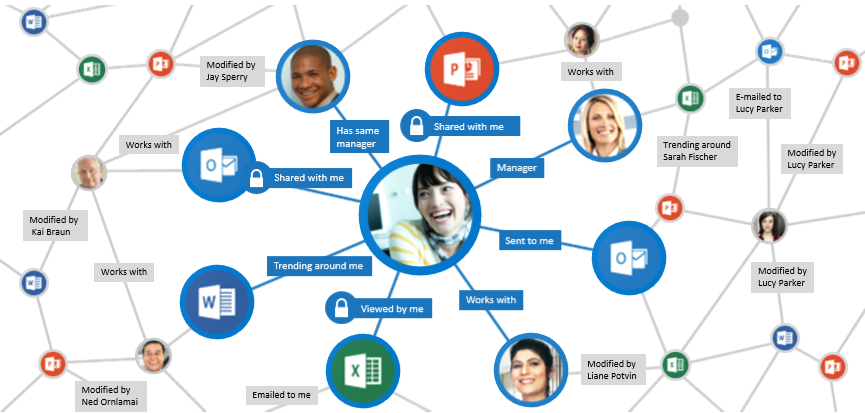How does Delve know what's relevant to me?
Important: Delve is retiring in December 2024. You can find similar features in other Microsoft apps. To make your transition off Delve as smooth as possible, we recommend you explore alternative options to Delve in Microsoft 365.
Delve shows you a mix of content from across Microsoft 365. You’ll see both your own documents, and documents your colleagues are working on. These are documents that are stored in OneDrive for work or school or SharePoint in Microsoft 365, or that have been shared with you as attachments in emails.
The documents you see on your Home page aren’t organized according to a timeline, for example last modified, or in alphabetical order. Instead, Delve organizes documents according to what’s likely to be most relevant to you right now. The same is the case when you search using the search box. You'll see personalized search results based on what's likely to be relevant to you.
So how can Delve know what’s relevant to you?
The brains behind Delve is the Microsoft Graph. The Microsoft Graph continuously collects and analyses signals that you and your colleagues send when you work in Microsoft 365. For example, when you and a colleague modify or view the same document, it’s a signal that you’re likely to be working together. Other signals are who you communicate with through e-mail, and who you’ve shared documents with, who your manager is, and who has the same manager as you.

Delve uses the result of the Microsoft Graph analysis to show you documents that are most likely to be relevant to you right now. For example, the Microsoft Graph will notice if several of the people you regularly work with, view a specific document. That document is most likely also interesting to you, so Delve shows it on your Home page.
The information on each content card helps you understand why a document shows up for you. For example, several of your colleagues viewed the document recently or someone you work with modified it.

What search results you see, depend on things like what you've been working on recently, who you've been working with, and what documents they've been working on. For example, if one of your close colleagues has written a document about a specific subject, this document will probably show up higher in the result list than documents written by someone you don't know.
Note: You'll only see documents you have access to. You can see your private documents and other documents that you have access to. Other people can see their documents and documents that they have access to.
How you work makes a difference
The more you and your colleagues use Microsoft 365 to work together, the more signals the Microsoft Graph can collect. More signals means a better analysis, which again means that Delve can show you more relevant content.










